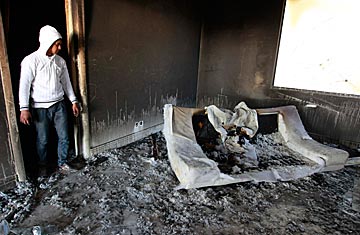
Inside the empty and ransacked home of Kaif Ben Ali, nephew of former President Zine al-Abidine Ben Ali, in the Mediterranean resort of Hammamet, January 16, 2011.
After weeks of deadly turmoil and mass protests, Tunisia might finally have a functioning government — but that does not mean the so-called Jasmine Revolution is over. Just three days after the country's dictator Zine El Abidine Ben Ali fled to Saudi Arabia after 23 years in power, those officials who remained behind — including politicians who for years were forced to operate clandestinely, as well as some of Ben Ali's key party faithfuls — pieced together a shaky coalition to run the country.
Shortly before Tunis's dusk-to-dawn curfew began on Monday, Prime Minister Mohammed Ghannouchi went on state television to announce that the interim unity government — which theoretically will run Tunisia until elections are held in six months time — will include some figures from Ben Ali's Constitutional Democratic Rally, or RCD, party. Those politicians will control the crucial defense, interior and foreign ministries — a sure sign that the President's influence, through the RCD, is not entirely over. And that is clearly not what many of the Tunisians who brought about the first successful revolution in the modern Arab world had in mind. Other opposition forces, including Islamist and Communist parties, remain outside the coalition and some key political figures are yet to return from exile.
Earlier in the day, hundreds of protesters mobbed the main Avenue Habib Bourghiba, chanting for the RCD to be "obliterated." Riot police fired tear gas to disperse them, clearly anxious that Monday — the first work day since Ben Ali's stunning fall — could turn into another day of chaos.
The RCD is believed to have millions of members, some of whom were charged with enforcing an increasingly corrupt government, and suppressing all dissent. In the downtown offices of the opposition left-wing Progressive Democratic Party, or PDP, members gathered to express their dissatisfaction; that prompted the PDP's diminutive secretary general Maya Jribi to shout them down and argue that the party had cut the best deal possible, during weekend talks with the Prime Minister, who was for years a Ben Ali loyalist and briefly held power after Ben Ali fled. In a sign of Tunisia's transformation, the PDP's leader Nejib Chebbi — whom TIME interviewed secretly in Tunis in 2007, while he was on hunger strike against Ben Ali's rule — is the new Minister of Regional Development. "There are RCD figures who have not been involved in corruption and dictatorship," Jbiri told TIME. "Plus, let's be practical: We need to save our country."
Yet plenty of Tunisians don't trust that pragmatic approach. They point out that Ben Ali made similar commitments to democracy when he took power in a bloodless coup in 1987, but that he quickly opted for a repressive dictatorship. "As long as the party of the president is there I don't think anything will get better," Mahssoud Romdhani, head of the Tunisian League of Human Rights in the central Tunisian city of Karawan, told TIME by phone. "All the slogans in the demonstrations were to get rid of this party. This party is responsible for all the corruption which exists."
Indeed, while the rest of the world has been transfixed by this extraordinary grassroots overthrow of a repressive regime, it is the rampant corruption of Ben Ali and his close circle — including massive embezzlement — which has ignited Tunisians' fury. Many of them say that it was that corruption — rather than repression — which broke Ben Ali's power. Still, the swiftness of the revolution has left many stunned. "If there is one lesson to be learned from all of this," said Mounir Khelifa, professor of English at the University of Tunis, "it is that dictators are giants with feet of clay."
As the full scale of the ruling family's wealth is laid bare, Tunisians have grown ever-more incensed. On Monday French officials estimated that Ben Ali's wife, Leila Trabelsi — a former hairdresser who accumulated vast wealth through her husband's power — had likely made off with about 1.5 tons of solid gold in late December, stolen from the Central Bank of Tunisia. "The gold can be found in Switzerland today," a senior French official, unnamed, told the French newspaper Le Monde.
All weekend, hundreds of Tunisians have traipsed slack-jawed through the remains of sprawling villas of Ben Ali's relatives, which were burnt and looted within hours of the longtime despot's escape last Friday. I joined them on Monday, to see the charred carcasses of mansions in a wealthy seaside suburb, near the ancient ruins of Hannibal's city of Carthage.
On a hillside overlooking the sparkling Mediterranean, the large home of one of Ben Ali's relatives, Moaz Trabelsi, lies ruined, burned and looted, with an uncooked lobster tossed into the swimming pool, presumably by looters. Looking back at the wreckage, Amel Jertila, 37, a businesswoman, told me: "Maybe this is a lesson for the next government and the next people who are responsible." On another hillside, I watched several Tunisians snap photographs incredulously of the elevator installed inside the two-story mansion of Adel Trabelsi, a nephew of the former First Lady, which is now burned to a crisp. As a school teacher, Trabelsi likely earned about $300 a month. Yet the rambling house included a mosaic swimming pool and outdoor shower, and large reception rooms. Upstairs, French fashion magazines and boxes of slimming creams lay scattered among the ashes. "Look at this," said Sarra Touzi, 35, an engineer enraged by the excess. "The economic development of Tunisia has been stolen."
Trabelsi himself thanked God, rather than the ousted Tunisian president, for owning a property worth perhaps millions of dollars. Above the front door, a marble plaque bears the Arabic inscription, reading: "This is thanks to Allah's munificence."
